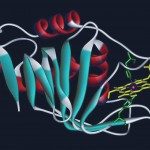Link to Pubmed [PMID] – 3470783
Proc. Natl. Acad. Sci. U.S.A. 1987 Apr;84(8):2155-9
Rigid 7H-pyrido[4,3-c]carbazole dimers, such as Ditercalinium, are DNA bisintercalators that display high DNA affinity and strong antitumor properties. This activity appears crucially dependent on the geometry of their complexes with DNA. Therefore, structures of the complexes formed by the self-complementary tetranucleotide d(CpGpCpG) with Ditercalinium and with a related monomer were investigated in 0.1 M [2H]acetate buffer (pH 5.5) by using 400-MHz 1H NMR. In both cases, d(CpGpCpG) retained a right-handed duplex structure as shown by exchangeable-proton analysis and intramolecular nuclear Overhauser effect measurements. According to the large upfield shifts measured on the base protons (including the imino proton) and on the aromatic protons of the pyridocarbazole rings, the monomer appears to monointercalate and the dimer to bisintercalate into the tetranucleotide duplex. Ditercalinium dissociates from its complex about 100-1000 times slower than does the monomer. The negative intermolecular nuclear Overhauser effects observed on protons corresponding to the convex edge of the pyridocarbazole rings when the sugar protons are saturated suggest that both ligands intercalate with their chain oriented to the wide groove side of the helix, a situation mimicking that encountered with repressors. Antitumor activity of 7H-pyridocarbazole derivatives is discussed in terms of geometry of the intercalated complexes.

